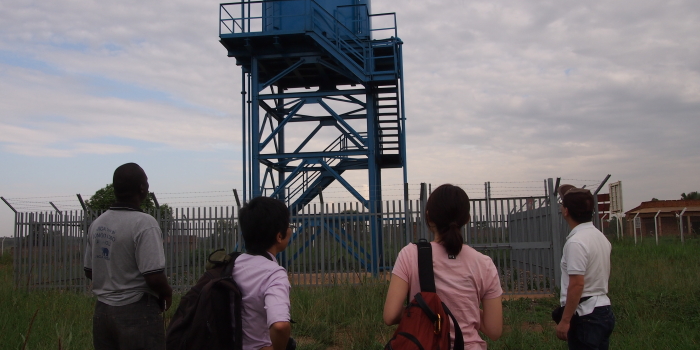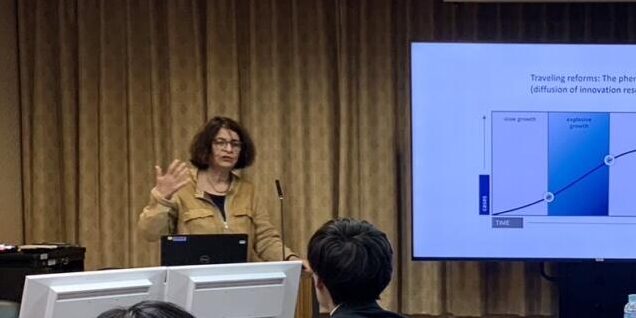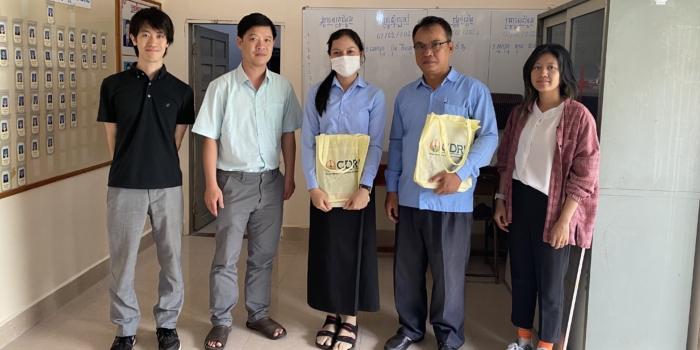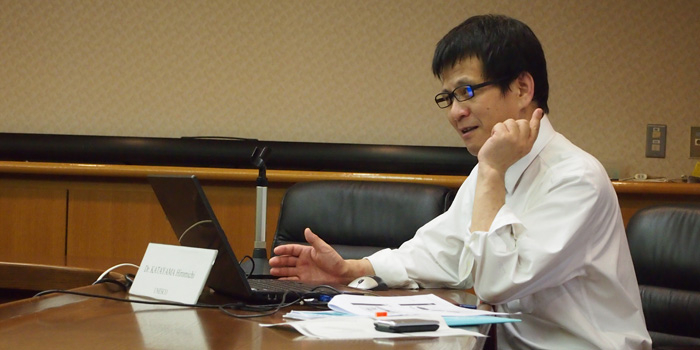From September 22nd to October 4th, I participated in overseas study in Uganda and Malawi under the supervision of Professor Yasuharu Shimamura. We had three achievements in Uganda namely; interviewing JICA Kampala Office; observing Terra Renaissance’s activities; and visiting JICA’s project sites in Northern region. In Malawi, we conducted two activities namely; interviewing JICA Malawi Office about the ongoing projects; and observing ISAPH’s activities on child nutrition.
Uganda
- Interviewing JICA Kampala Office
We went to JICA Kampala Office and interviewed one officer of JICA Uganda. He introduced to us a lot of projects which JICA Uganda has conducted, but he especially highlighted the importance of Uganda as a hub of transportation in neighboring countries. We also had a fruitful discussion on each JICA project, especially projects of infrastructure, agriculture, and education. Though I am studying about primary education, it was a good opportunity for me to learn about various developmental issues, and to consider how to utilize my research findings for overall development of Uganda.
- Observing Terra Renaissance’s activities
A Japanese NGO, Terra Renaissance works in Gulu, which located in Northern Region of Uganda. As a main mission, they provide vocational training of furnishing and tailoring to ex-soldiers, war-affected people and extremely poor people. After one and half year of training, graduates receive financial assistance to start business. We observed their lessons and graduates’ products at the school. Students really concentrated on learning, and their products had high quality. In addition to such support for financial independence, Terra Renaissance takes care of their PTSD or trauma caused by armed conflict. Some of the students were single mother, and they came to school with their children. It made the school like one community which included ex-soldiers and war affected people. I was really moved to see that both ex-soldiers and war-affected people were respecting each other and learning together at one place.
After visiting their vocational school, we met graduates who have already started business. They explored future and started new life with the success of their business. These experiences made me think of not only the effect of armed conflict in Uganda, but also the importance of such grass-rooted activity. Since my research aims to scope the whole Uganda, it was a good opportunity to learn about civil war in Northern region.
- Visiting JICA’s project sites in Northern region
 We visited JICA Gulu Field Office and interviewed about their projects. Rehabilitation of Northern Uganda has been one of the pillars of JICA Uganda. JICA Gulu Field Office has provided assistance for water supply, road construction, schools, and capacity development of regional government officers. We discussed the positive and negative impacts of such assistance. For example, road construction can encourage transportation and economic development, but also let more people pass and commit crime. In Norther region, armed conflict destructed not only infrastructures but also communities. Such assistance for infrastructure is important for revitalize communities.
We visited JICA Gulu Field Office and interviewed about their projects. Rehabilitation of Northern Uganda has been one of the pillars of JICA Uganda. JICA Gulu Field Office has provided assistance for water supply, road construction, schools, and capacity development of regional government officers. We discussed the positive and negative impacts of such assistance. For example, road construction can encourage transportation and economic development, but also let more people pass and commit crime. In Norther region, armed conflict destructed not only infrastructures but also communities. Such assistance for infrastructure is important for revitalize communities.
In Uganda, we observed JICA and Terra Renaissance, which have different scale. Both have merit and demerit, which made me think of the definition of development assistance again. I also came to consider how to reduce my research findings to Uganda, seeing Uganda from various aspects.
Malawi
- Interviewing JICA Malawi Office about the ongoing projects
 We went to JICA Malawi Office and presented at a lecture of JICA projects in Malawi. He explained general information of Malawi and educational projects. He especially highlighted a serious financial problem of Malawi, which was the obstacle of development. Recently donors have stopped budget support because of corruption, and Malawi’s ability of foreign currency acquisition has not grown. It makes the situation severer.
We went to JICA Malawi Office and presented at a lecture of JICA projects in Malawi. He explained general information of Malawi and educational projects. He especially highlighted a serious financial problem of Malawi, which was the obstacle of development. Recently donors have stopped budget support because of corruption, and Malawi’s ability of foreign currency acquisition has not grown. It makes the situation severer.
After the briefing, we visited one secondary teachers college and a secondary school which JICA volunteer have been dispatched to. In terms of education, Uganda and Malawi had several commonalities, such as exam-centered education, chalk and talk style of classes, low teacher’s salary or lack of teacher’s houses. However, there is a difference in teacher’s career path; Ugandan teachers are likely to be absent from schools; but Malawian teachers tend to quit schools rather than be absent. Considering such difference can make my research about Uganda deeper. I found it essential to take into account of not only one country but also more countries, and to broaden my horizons.
- Observing ISAPH’s activities on child nutrition
A Japanese NPO, ISAPH in Mzimba, which located at Northern region of Malawi, works on child nutrition. We interviewed officers of ISAPH and observed their activities. As a main activity, ISPAH runs a project of conducting growth monitoring on children aged less than 5 years old. Child nutrition is an important and common issue in African countries and it has been said that it’s related with education. If parents don’t have enough literacy, they cannot note their children’s health condition on their health passport. When they don’t have enough knowledge, they cannot understand the importance of health nutrition. Even in health project, we found that education plays a big role.
In Malawi, we observed education and health projects. I learned a lot of perspectives to introduce in my research on Ugandan education. This experience made me feel it important to broaden perspectives.
Throughout the overseas study, we went to many places, met many people and learned about various developmental issues. Though my research has a focus on education, this overseas study helped me gain more knowledge of such issues, which would also fruit my research. In conclusion, my deepest gratitude goes toward Prof. Yasuharu Shimamura who supervised this overseas study, to all people who guided us, and to Prof. Keiichi Ogawa who provided me this opportunity and supported me throughout the overseas study.
(Takeru Numasawa)
Related


 We visited JICA Gulu Field Office and interviewed about their projects. Rehabilitation of Northern Uganda has been one of the pillars of JICA Uganda. JICA Gulu Field Office has provided assistance for water supply, road construction, schools, and capacity development of regional government officers. We discussed the positive and negative impacts of such assistance. For example, road construction can encourage transportation and economic development, but also let more people pass and commit crime. In Norther region, armed conflict destructed not only infrastructures but also communities. Such assistance for infrastructure is important for revitalize communities.
We visited JICA Gulu Field Office and interviewed about their projects. Rehabilitation of Northern Uganda has been one of the pillars of JICA Uganda. JICA Gulu Field Office has provided assistance for water supply, road construction, schools, and capacity development of regional government officers. We discussed the positive and negative impacts of such assistance. For example, road construction can encourage transportation and economic development, but also let more people pass and commit crime. In Norther region, armed conflict destructed not only infrastructures but also communities. Such assistance for infrastructure is important for revitalize communities. We went to JICA Malawi Office and presented at a lecture of JICA projects in Malawi. He explained general information of Malawi and educational projects. He especially highlighted a serious financial problem of Malawi, which was the obstacle of development. Recently donors have stopped budget support because of corruption, and Malawi’s ability of foreign currency acquisition has not grown. It makes the situation severer.
We went to JICA Malawi Office and presented at a lecture of JICA projects in Malawi. He explained general information of Malawi and educational projects. He especially highlighted a serious financial problem of Malawi, which was the obstacle of development. Recently donors have stopped budget support because of corruption, and Malawi’s ability of foreign currency acquisition has not grown. It makes the situation severer.



